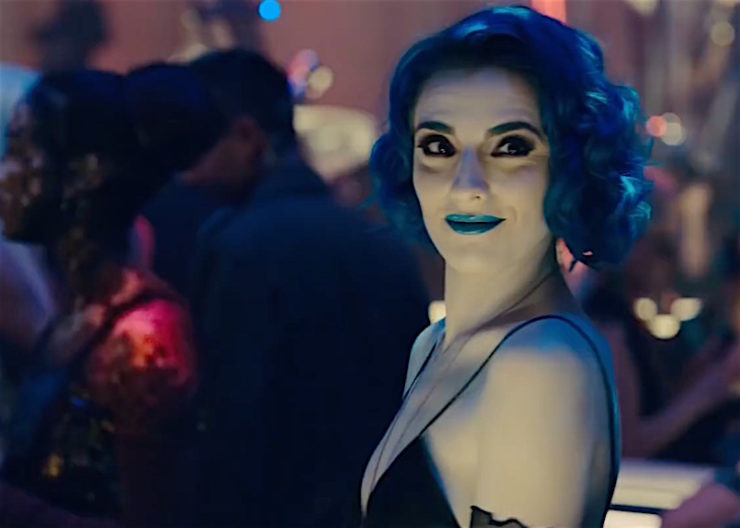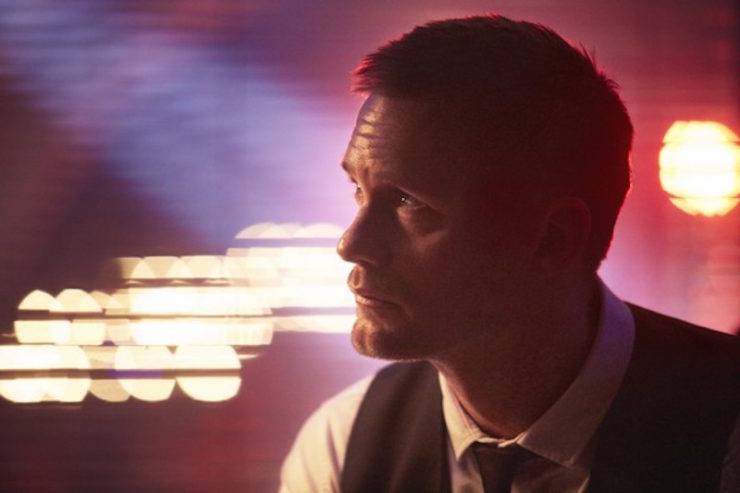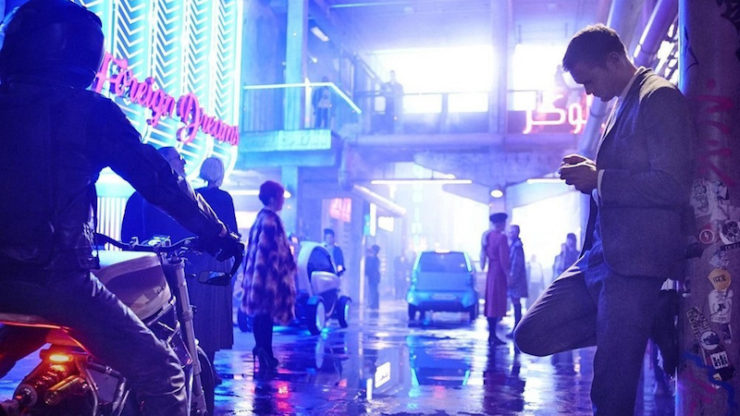I saw Witness for the first time when I was about nine years old. In case you’ve never seen it, grumpy detective Harrison Ford has to go undercover in an Amish community, and naturally falls in love with both barn-raisings and Kelly McGillis, because who wouldn’t. It’s a great film, with a surprisingly vulnerable performance from Ford—but that’s not what I’m here to talk about. The reason the movie is called Witness, and the reason Ford has to go undercover, is that a tiny, shy Amish boy witnesses a gruesome murder in a train station. A man’s throat is slashed, and the boy stares in horror as he fights and falls to ground, blood gushing from his throat. This made a huge impact on me because it was the first time I realized that a person didn’t just die instantly if something like that happened. It took a long time for a person to lose enough blood to kill them, and it looked excruciating.
The reason I mention that is because that scene seems to be at the heart of what Duncan Jones was trying to do with Mute. I don’t think the film works, but there is a lot of fascinating stuff in it, some gorgeous imagery, and also some truly horrific violence. I’ll give you a non-spoiler review (though it does touch upon some plot points) below.
To start with, I’ve already seen arguments on Twitter about the film being unfairly reviewed, about it being yet another marker, along with The Last Jedi, Bright, and most recently Annihilation, in a “critic” versus “regular moviegoer” divide. Personally, I don’t believe that divide exists—but I also don’t believe in the concept of regular people. I am paid to critique movies, and I have studied film, but my first responsibility is to tell people what I think the film was trying to do and whether I think it succeeded, then to talk about my own emotional reaction. Every review is a Your Mileage May Vary situation, every critic has their own taste informed by their life experience, and every moviegoer is entitled to their opinion. I think good critique, which is hopefully what I’m flinging at the world, is rooted in looking at each film’s themes and structure, talking about the historical context, talking about the film’s relationship to its genre, or to its filmmaker’s other work. Basically, doing a ton of background work so that people who just want to go watch a movie can do that without having to run to Google. I also think it’s part of my job to look at how the film interacts with its era. Will it hold up? Will it be a film that people return to? Who is this film for? Who is being centered, and why?
Now, Mute has been savaged by critics, and it doesn’t seem to have a very high rating among Netflix viewers. But William Gibson loved it. And the people who talked about liking it on various social media feeds seem to really like it. For my part, I didn’t exactly like it, but I’m still thinking about it four days later. I don’t know if it worked, exactly, but it was definitely attempting something different. This is a weird, jagged, misshapen movie. Jones chooses to go into some dark places, to let his story meander down tangents and gutter out in narrative cul-de-sacs before revving up and starting up again. It unspools the way an actual missing persons investigation would proceed, especially if it was being conducted by someone who isn’t a trained detective.
First, some plot: About 40 years in the future, in a gorgeous, Blade Runner-esque Berlin, a mute Amish man named Leo works as a bartender in a strip club. Leo is mute because an accident slashed his vocal cords. (Cue Witness theme music.) Leo is a man out of time. He dresses in traditional Amish clothing and avoids tech, essentially cutting himself off from most of the life around him. He also whittles. He’s dating a woman named Naadirah, who waitresses at the stripclub. The two seem to be about to move their relationship onto a more serious level, and Naadirah intimates that she has something important to tell him, but then disappears. Leo spends the rest of the film trying to track her down, delving ever deeper into Berlin’s underworld, and learning that his girlfriend had a complex secret life. As his search continues, an American doctor named Cactus Bill trades back alley patch-up jobs to gangsters in exchange for legal paperwork—he wants to get the hell out of Berlin, but he’s not leaving without his daughter Josie. He works with an old Army medic buddy, Duck Donald. These two plotlines mirror and loop around each other before colliding in a deeply unsettling way.

The cast is excellent.I think Alexander Skarsgård does a great job with the difficult character of Leo, creating a character using only his eyes and body language. Seyneb Saleh does as much as she can with Naadirah, given that she’s only onscreen for a short time. Paul Rudd turns his performance into an inversion of every snarky man he’s ever played, with Cactus Bill becoming a sort of psychotic Ant-Man, balancing his criminal work and horrifying violence with what seems to be genuine care for his daughter. Justin Theroux is charming as Duck…right up until the second that you realize Duck isn’t charming at all. I would say one of the problems with the film is simply that these two are so loathsome, and so good at acting loathsome, that it pushes you out of the film. I will also note here that Mute is incredibly violent and graphic. From the first scenes where you see Leo’s accident, all the way through the ending, it even made me wince a few times, and I am a hardened, desiccated walnut when it comes to onscreen violence.
The worldbuilding works for me. While the film obviously draws on Blade Runner throughout, there are also nods to Casablanca, The Third Man, A Clockwork Orange, and Chinatown, but Mute does have its own story to tell rather than just recycling references. It shows the stratification of society in ways I found realistic. There are still diners and coffeeshops, and plenty of people drive on the ground while flying cars whizz above them. Modern phones are lavalier pendants, but some people do still have rectangular block phones. Food is delivered by a drone service called “FlyMeals,” and seems to come in a variety of types—I saw American-style burger meals and a FlyMeal box labelled “Afghanische.” The music is perfect, as Jones has mixed covers of David Bowie’s Berlin classics with background Christmas music, and, in a truly great moment, a lullaby version of Nirvana’s “Heart-Shaped Box,” because of course Nirvana is nursery music 40 years from now. There are also some nods to Moon that place Mute firmly in a shared universe. Leo lives in Berlin because, decades ago, Germany put out a call for the Amish to come back to their homeland. At least some of those who answered that call have remained strict, and stand out even more in a neon-lit world abuzz with flying cars and drone-food. As in Witness, it’s apparently considered OK to walk up to Amish people and question their beliefs; this happens to Leo, but he obviously can’t reply vocally, and doesn’t bother to write any answers—his bland smile indicates that he’s used to invasive questions from strangers. So what we have here is a great cyberpunk/noir structure, with some interesting subversions. Leo takes the taciturn Bogie/Ford aesthetic to an extreme because he literally cannot speak. The doctors are burned out and immoral. There are no sex workers with hearts of gold here: they all keep their eyes firmly on their money. The sex workers themselves are a mix of women, men, and genderqueer people, and some of the strippers are robots. The underworld, for the most part, is just the underworld, entirely run by men who just want to keep business chugging along as usual.
But here is a place where I have to step back and qualify what I’ve just said: Yes, the worldbuilding is great. BUT. Is Leo still religious, or does he simply follow some traditions to maintain a connection with his heritage? If he is religious, then why is his relationship with Naadirah OK? One of the problems I had with the film were the multiple instances of gay panic—it was like Jones took the time to include openly gay and genderqueer characters in his vision of the sex worker community, which is good (and a definite improvement over the usual lazy strip club trope of “women dancing while burly men work out business deals”) but then took a step back by having Leo, our main character and audience proxy, react with revulsion to these characters. So…is sex outside of marriage fine to Leo, but queerness isn’t? Or is he non-religious, and simply homophobic? But again, how the heck does this character end up tending bar in a stripclub? So I’m left liking the idea of Leo as a mute, introverted man, and I like the theme of muteness in a loud and frenetic world, but I’m not sure Jones shows us enough of Leo’s inner life so we can parse out his responses to sexuality and modernity.

Duncan Jones wrote the beginnings of Mute fourteen years ago, and initially planned to make it before Moon, but only worked out a distribution deal with Netflix for this year. In Mute’s case, I think that causes a few problems. There are elements here that don’t work nearly as well in 2018 as they would have in the early ’00s: the gritty stripclub, the aforementioned gay panic jokes, and a jarring tone that slingshots between grisly violence and wacky humor. Most frustrating for me was the fact that the film is an exploration of violence against women that doesn’t give the women nearly enough screentime. Since Naadirah disappears early in the film, we end up having her life mediated by her friends and employers—all men or genderqueer people—until we meet her mother, who doesn’t speak much English and isn’t subtitled in her mother tongue, so we end up with an awkward, half-mimed conversation. Which is good on one level, because I think it’s an interesting commentary on powerlessness, and works well with the larger background concept that future Berlin is a city of immigrants, many of whom have fallen through the cracks of society. But it’s also frustrating that the only other woman who really gets to speak can’t be understood.
Which leads me to the pedophilia subplot. I’m still trying to think about how to write about this. My initial response to this part of the film was one of such revulsion that I wanted to dismiss Mute entirely. But I have to wonder: isn’t that the point? If pedophilia appears in a film, and the audience isn’t horrified, then something’s gone terribly wrong. And there are points where I was furious with the film for using child endangerment as a plot point, but then, how else can you tell the story? If you’re going to deal with this topic at all, you have to be willing to reckon with some dark, dark corners of the human psyche. Doesn’t hinting at it, and then backing away, do a disservice to people who have survived this kind of violence? So the points where I was pushing myself back into my couch, thinking “don’t do this, don’t do this” over and over again—that’s the response Duncan Jones wants. The film has worked when I have that response. It just isn’t too pleasant to sit through. I’ve seen other critics say that it comes out of nowhere and should have been cut, but the more I think about the movie, the more I think that this is the idea Jones wanted to explore.

So, to get back to Witness. As I mentioned, that film hinges on a child’s innocence being violated by a horrific act. The Amish boy has grown up on a farm, and has almost certainly seen animal mating, birth, and slaughter, and in some ways is more worldly than a suburbanite buying pre-packaged chicken and hamburger meat. But watching the murder of a human man is a very different thing. I might be completely wrong here, but Mute opens on a young Amish boy having his throat slashed in an accident. We float in the water with him as the blood gushes out, we go with him to the hospital as his blood soaks the towel his mother is using to save his life. And then the whole film is bookended with another particular act of violence, when another character’s throat is slashed. Again, we spend long, long moments with this character, watching the blood pool under their head, knowing that life is seeping out one drop at a time. Around these two acts is a meditation on the innocence of children, and whether or not it can be preserved in a rotten world. In Leo’s case, his accident not only destroys his own physical innocence, but cuts him off from other people in a particular way. We learn that he’s spent his life dealing with the trauma as evidenced by his obsession with swimming, dolphins, and a ritual in which he practices holding his breath while drinking water. As an adult, Leo finds his life tangling around that of a very small girl who is being dragged through Berlin’s underworld, with various characters trying to protect her innocence and various other characters trying to destroy it. It becomes clear that this is the theme of the film: that push/pull between innocence and experience, and a meditation on what makes a hero. I don’t think it comes into quite sharp enough focus, but there are powerful moments dotted through the whole movie.
Mute is a long and messy film, and parts of it don’t work. There’s also a certain Return of the King effect, where it seems the film is ending before starting back up and going off in a wildly disturbing new direction. Personally, while I probably would have cut about twenty minutes over the course of the movie, I was willing to go where it took me. While I doubt this film is going to become the cult classic that I think its fellow “difficult” February release Annihilation will, I certainly don’t regret watching it, and I even hope the Jones returns to sci-fi soon, just maybe with a tighter script.
Leah Schnelbach would really love to visit future Berlin, despite all the seediness. Come talk to her about flying cars on Twitter!










